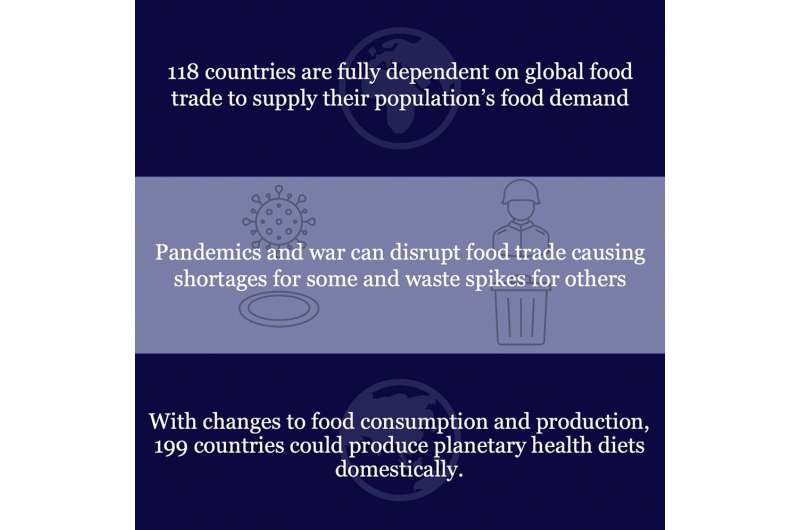Is it possible for countries to produce all their food nationally?

Is it possible for countries to produce all their food nationally? According to a new study, for half of the world population the answer would be yes. For the other half: maybe? Leiden environmental researcher and head author Nicolas Navarre explains, “With improvements to crop yields, reductions in food waste, and changes in consumption patterns, 90% of people could live in countries that don’t need to trade for food.”
There are many advantages to nationally produced food. Cutting down on transportation decreases the carbon footprint of many crops. And by being less dependent on production in other countries, our own food supply could become more robust. Only recently, the global trade-based food system has undergone historic shocks due to the COVID-19 pandemic and war in Ukraine, creating both extreme spikes in food waste and massive food shortages around the world.
But to what extent is it possible to stop all food trade and only eat nationally sourced food? A new study, published in One Earth, examines for all countries whether a healthy diet can be achieved with just nationally produced food. “We find that around half of the global population lives in countries which would not be able to rely on national production alone,” Nicolas Navarre, lead author of the paper, says.
The Netherlands as well is one of these countries, being a small country with limited space and a high population density. Which is why it is heavily dependent on trade for its food. “We find that the country would not be able to sustain itself without relying on trade,” Navarre points out, “unless we make a number of major changes to our food consumption patterns.”
What kind of world would we live in? “Well, it sounds almost cliché, but the biggest thing as always is meat consumption,” Navarre states. “Becoming self-sufficient means that we can’t rely on other countries to make feed for cattle. All the soy and grains we now import from countries like Brazil, Russia and Ukraine have to be nationally grown, which is impossible.”
“The quickest and easiest way to be able to become self-sustainable is to reduce meat consumption to one day a week, because you’re reducing both the amount of land for the livestock itself and the amount of land needed to grow their food: hitting two birds with one stone,” Navarre explains. In that world we would only have a fraction of the livestock animals.
Reducing meat consumption is by no means the only route to decrease our demand for land. Consumers of high-income countries generally waste a lot of food in comparison to other countries in Asia and Africa. By cutting down on such food-waste, we would need less food and less space to produce that food.
“Reducing meat consumption alone would be enough for us to become self-sustainable,” Navarre expands. “But by reducing food waste as well, we create some room to play with the consumption levels. Throwing less food out means being able to eat some more meat. Like, one or even two days extra per week.” Though it must be noted that this study looks only at land-use and not any other environmental impacts of consuming animal products.
So, should we eat less meat and cut all trading ties with other countries to become fully self-sustainable? “No,” says Navarre, “Just like being fully dependent on trade makes you vulnerable, being fully independent does the same thing.” If some local disaster or disease hit a country, global trade would function as a safety net for food security.
The answer, as always, lies somewhere in the middle. “We want to show how dependent on trade countries have become,” Navarre explains. “Countries should explore pathways to shift more towards independency. By producing a little more of our diet nationally we’ll rely less on others. That way, the store shelves stay stocked, even if another pandemic hit.”
More information:
Nicolas Navarre et al, Interventions for sourcing EAT-Lancet diets within national agricultural areas: A global analysis, One Earth (2023). DOI: 10.1016/j.oneear.2022.12.002
Citation:
Is it possible for countries to produce all their food nationally? (2023, March 7)
retrieved 7 March 2023
from https://phys.org/news/2023-03-countries-food-nationally.html
This document is subject to copyright. Apart from any fair dealing for the purpose of private study or research, no
part may be reproduced without the written permission. The content is provided for information purposes only.
For all the latest Science News Click Here
For the latest news and updates, follow us on Google News.

